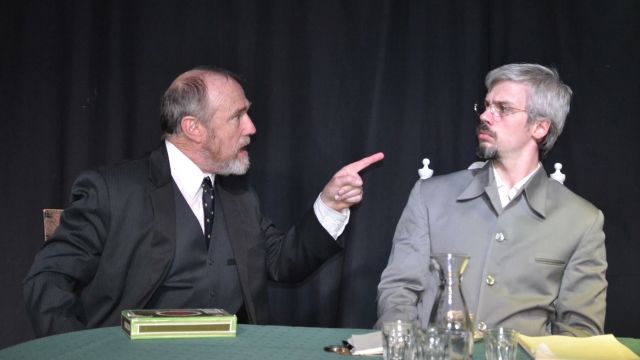Trotsky and Friends
In Travesties, Tom Stoppard put together historical figures who really were in the same place at the same time: James Joyce, Vladimir Lenin, Nadya Krupskaya, and Tristan Tzara in Zurich in 1917 – that is, during The Great War. With Trotsky and Friends, Brendan Black discovered that a raft of famous people all were – or could’ve been - in Vienna in 1913. Trotsky, trying to finish the book he’s writing and our Narrator, Lenin, a young Stalin, a younger Tito, Freud, Jung, Prince Franz Ferdinand and Duchess Sophie and Alma Mahler. Were they all together at the same time in a Vienna café - the Café Central? Unlikely, but that doesn’t, or need not matter. The company is served by Ludwig, a hapless, near-sighted waiter, and later they are joined by a penniless – and talentless – young artist… Guess who. So, we are on the eve of The Great War and it’s a situation potentially redolent with irony: we know what will happen next.
Obviously, there are lot of characters on stage at once, but Mr Black solves that problem by seating them all (except Franz Ferdinand and Sophie) for nearly the whole show along one side of a long table. The image is reminiscent of Da Vinci’s Last Supper, with Trotsky as Christ. Perhaps this is deliberate (Trotsky as Jesus? Stalin as Judas?) but it is also too static and stultifying to last so long.
With such an assembly of characters – okay, perhaps a little contrived, especially so in regard to a Hapsburg prince dropping in – we might expect some insight and comment on these people who shaped events and thought across the 20th century. Despite some illuminating flashes, however, this doesn’t happen.
Firstly, on the simplest level, Mr Black has his cast speak in what are supposedly Russian, Georgian, Croat and Austrian accents. This they do – with exceptions – rather badly, so that a good proportion of the dialogue is aural mud. In the case of Trotsky (Vlady T, apparently a real Russian), about 100%. Lenin (Chris Gaffney) and a strangely blustering Freud (Larry Fildes) fare little better. But Milijana Cancar is cool and charming as Sophie and both she and Tasha Sanders as modest, winsome Alma Mahler merely hint at accents and so come across clearly. Would that what both have to say had more substance. Tommy Kay, too, makes a real character out of Stalin; he maintains an accent, but is clear, and he’s genuinely menacing – the former seminarian, bandit and smuggler who’s found his way into politics – and because of his performance, we get a sense of the monster to come.
Otherwise, presumably in the name of ‘comedy’, these characters bear scant resemblance to what we know about the real historical figures. Thus, sly comment on them or insight into their ideas is sacrificed. Yes, comparisons may be odious, but where Tom Stoppard uses the failing memory of a consular official to convey his historical figures, mixing them up with a concurrent performance of The Importance of Being Ernest, and going far beyond the novelty of skewed biography, Mr Black has his characters simply get more and more drunk until their evening descends into mere vituperation and bickering and Trotsky is stuck with the bill.
We’re not asking for ‘historical accuracy’, but why put these figures on stage unless to say something about them and how they made the future? Instead, we get simplistic disagreements, nuance-free. Yes, Freud and Jung (Matthew Parker) fell out, but was Jung a stammering young fellow intimidated by the older Freud’s disapproval? What did they fall out over? Yes, Freud fainted in Jung’s presence, but wasn’t it because of Jung’s boundless confidence? Was Tito (Marcus Cain) really a protégé of Stalin? When Franz Ferdinand (Colin Donald) and Duchess Sophie drop by the café – supposedly to get to know ‘the people’ – what do they talk about? ‘Let’s visit Sarajevo.’ This seems to be the point of their inclusion - except for Stalin’s sneering at them and Freud’s sycophancy – the latter a new character trait for me. Alma Mahler had three husbands and a number of lovers, so that seems to be reason to depict her here – after shy, tongue-tied (!) Jung has fled – as desperately taking the gormless waiter, Ludwig (David Todman) home to her bed. It’s a very cheap laugh in a show of many.
This production premiered at last year’s Comedy Festival and toured regional Victoria. The play and Mr Black himself received positive reviews. I’m sorry I can’t echo these, but for me Trotsky and Friends is a very good idea that disappoints in execution.
Michael Brindley
Subscribe to our E-Newsletter, buy our latest print edition or find a Performing Arts book at Book Nook.

